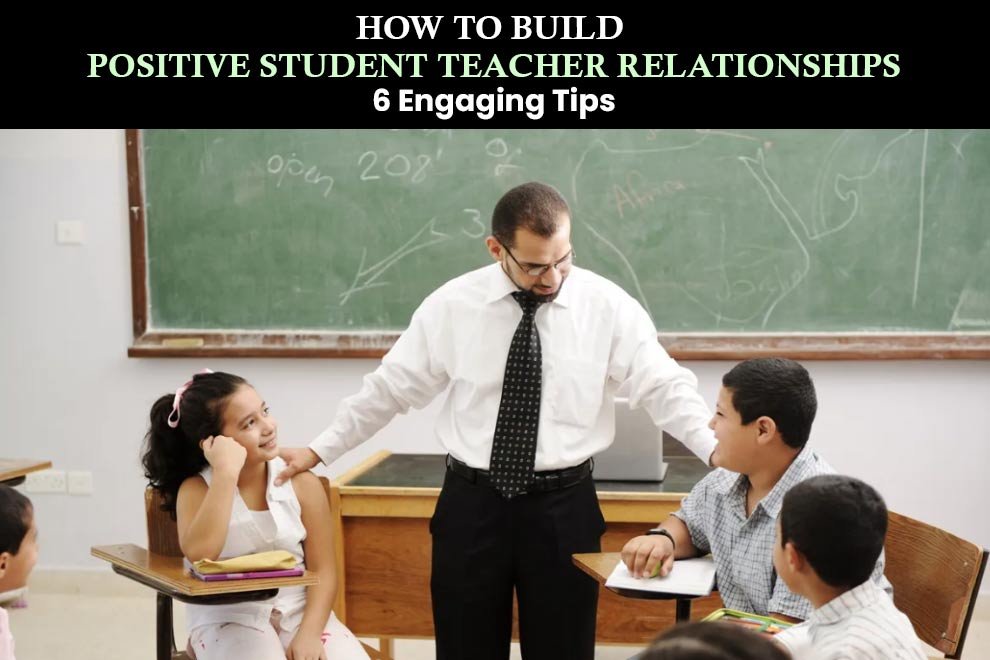Every school wants their children to perform well. And sometimes, in our pursuit of better scores and setting state and district standards, we often need to remember about our students! We need to remember to even understand whether the students are actually having fun with learning, or are they just listening but not absorbing. This is where the importance of student-teacher relationships comes into play. Let us understand why.
Why do Positive Student-Teacher Relationships Matter?
Student-teacher relationships significantly impact teacher effectiveness and student achievement. Students will work harder and learn better from teachers who are empathetic, encouraging, authentic and respectful. Not only does a strong teacher and student relationship help in the overall development of the ward, but it also helps the teacher with classroom management and maintaining harmony.
So that now we know the importance of student-teacher relationships, let us note down some valuable tips on how we can build a positive classroom environment by bettering them.
6 Ways to Build Positive Teacher-Student Relationships:
1. Establishing a welcoming classroom environment:
Each time students enter your classroom, they should feel like they are entering a welcoming environment that is conducive to learning and tolerant and respectful of their individual needs and problem areas. A positive classroom environment can make the students feel physically safe and emotionally secure, where their diversity and differences are celebrated, their conflicts are resolved with respect, and they can voice their thoughts and fears. You can help the students address them, creating a stronger teacher and student relationship.
2. Familiarize yourself with your students:
Positive student-teacher relationships are built on one singular foundation, which is understanding. You as the teacher and mentor need to get to know and truly understand your students. Who they are, what are their passions and fears, what are their learning styles, and what are their strengths and weaknesses, you should be able to understand all of these. By taking the time to learn about your students as individuals, you can then tailor your teaching to meet their individual needs, and build rapport and trust with them.
3. Trust in the ability of all students to thrive:
You must believe that every child can succeed. Your strong belief in their skills and abilities will encourage them to believe the same! The importance of student-teacher relationships is highlighted when you realise that the standards you hold them to, they shall eventually learn to do the same. Push the students to achieve more than they thought possible, but always provide them with a safety rail along the way, so that they can lean on you when they need it.
4. Encouraging student voice and choice:
The more you provide students with choice and autonomy, the more they’ll see that you value them as individuals. Encouraging student choices could involve allowing students to choose topics for assignments, offering options for different activities supporting various learning styles, or giving students a say in how they demonstrate their understanding of a concept. A positive classroom environment can only be fostered when students aren’t afraid to speak up and elucidate what they want. Encourage the students to develop original opinions, ask questions, and share personal ideas about the subject matter.
5. Giving frequent feedback and praise:
An empowering and supportive teacher-and-student relationship depends on frequent honest feedback and praise for achievements. When teachers provide regular, specific, and actionable feedback, it can help students develop a growth mindset and become more resilient learners. Additionally, apart from constructive criticism, praising students for their small achievements will help them feel seen and motivated, which will help them develop a more positive work ethic, a keen sense of self, higher engagement in the classroom, and a positive attitude towards learning.
6. Showing empathy and understanding:
The importance of student-teacher relationships is that the teacher is not only a mentor but also a confidante, who guides students through the twists and turns of life. When teachers show understanding, they acknowledge and validate their students’ experiences, feelings, and perspectives. This can help to build trust and respect between students and teachers. The teacher should try to be empathetic to the emotional and mental state of the student, and support them through any turmoil. This will foster positive student-teacher relationships, and create a more engaged and motivated learning environment.
When teachers take the time to foster deep connections with their students, they are not just absorbing personal information, but creating a base for lifelong learning. A strong teacher and student relationship not only makes the students perform better, and become highly motivated and enthusiastic learners, but it transforms the teacher from an educator to a mentor. So, take the time and invest in creating positive student-teacher relationships, and ensure a flourishing and engaged classroom! These skills are particularly essential in TEFL teaching, where understanding and connecting with students from diverse linguistic and cultural backgrounds is paramount.










